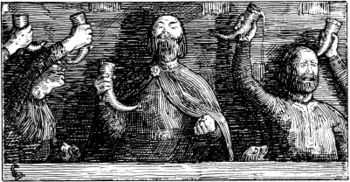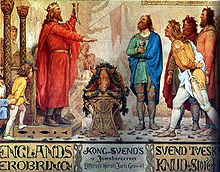Sumbel

The sumbel (an. Sumbl; aeng. Symbel, as. Sumbal) was an important ritual drink or a ritual drinking bout of the Teutons . It was always inside, i.e. H. usually held in the longhouse of a chief. In contrast to a festive or solemn drink, a sumbel was a serious event that followed a strict rite.
Sumbel is mentioned in the Anglo-Saxon Beowulf epic (lines 489–675 and 1491–1500), in the Old Saxon Heliand and in the Anglo-Saxon poems Dream of the Rod and Judith . The ritual can also be found in the Edda song Lokasenna , the Heimskringla , in the report on Sven Gabelbart's funeral drink for his father and in the book about the Norwegian kings, the Fagrskinna .
etymology
Linguistically, the word sumble has a common origin with the verb collect . Etymologically, the term Sumbel is derived from the Proto- European * sumlan "banquet", or from the root word * sm-lo- , "assembly". Orthographic variants are Old English symbel , sumble or symle , Old Saxon sumbal and Old Norse sumbl . The Swedish cultural historian Viktor Rydberg saw a connection with the legendary Finnish King Sumble, who was handed down as a drunkard .
General rite
Roughly outlined, a Sumbel proceeded as follows: It was generally opened, directed and ended by a Sumbel giver (as. Symbelgifa). As a rule, the chief with whom the Sumbel took place held the function of Sumbel giver. In the middle of the participants was a boiler that with Met or Elder (beer) was filled. After the kettle was consecrated, a drinking horn was filled with the drink from this kettle. Then this drinking horn circled among the participants of the Sumbels, whereby it was passed on by a tapmaiden (mostly the wife of the chief) and refilled if necessary. In the first round, toasts were made to drink to the gods. In the second round, the deceased relatives were remembered. During the third and subsequent rounds, the participants swore oaths, made vows, and performed songs or poems. Food and other festivities were explicitly separated from the sumbel. Nor were any libations offered to the gods as part of the Sumbels.
The Anglo-Saxon symbol
In Anglo-Saxon literature, the host who organized the Sumbel or Symbel was referred to as a symbelgifa (Sumbel donor). The so-called Þyle played a special role in the context of the humble . He questioned or challenged those with mockery and taunts ( flytung ) who bragged ( gielp ) or swore oaths ( béot , bregofull ) in the sumbel rounds . It was the duty of the Þyle to maintain the salvation of the community. Oaths sworn when humming were considered binding because they could influence the wurt of all participants in the humming.
In addition, the so-called Scop ( Old Norse skald ) played an important role in Sumbel. He recited a. a. Family trees of kings and heroes and alliterative poetry. The mead or the beer were usually distributed by women in the role of ealu bora (literally “Älberger”). The first round was usually served by the lady of the house.
In the culture of the Normans and Vikings , swearing oaths on the chief's horn while drinking was an integral part of certain festive occasions. In the Scandinavian sagas , a drinking vessel is often reported in connection with a sumbel, which is referred to as bragarfull or bragafull . The term bragar- or bragafull can be translated as "oath" or "chief's cup" (compare Bragi ) and simply as "best cup".
The name of this vessel appears in two spellings, which makes the interpretation of the term difficult. The word bragr , which in Old Norse means something like “best” or “most outstanding”, is the basis of the first part of the word. The spelling bragafull , in contrast to the spelling bragarfull , can also be called ' Bragi ' s Becher, i.e. H. be translated with reference to the Germanic poet god Bragi, although in the scriptures no special reference is made between the god Bragi and the Sumbel or the bragafull .
Snorri Sturluson describes in his Heimskringla , in the saga of King Hákon the Good , the custom of Bragarfull :
... Fires were lit in the center of the temple hallway, and kettles should be over them, and full goblets should be passed over the fire. But the organizer and leader of the feast (the god ) should bless the cups and the entire sacrificial food. First one should drink the Odin's cup for the victory and reign of his king, and then the cups of Njord and Frey for a fruitful year and peace. After that, some men used to drink the Bragi cup ( bragafull ). People also drank cups on their relatives who were already in their graves, and these were called memory cups ( minni ) ...
In the Ynglinga Saga (also part of the Heimskringla ) Snorri writes the following:
... It was the custom at that time that, when an inheritance meal was to take place for kings or Jarle, who organized it and was to inherit, sat on a stool in front of the high seat until the cup was brought in, which is called a Bragibecher ( bragafull ) called. He should then get up to take the Bragi cup ( bragafull ) and take a strict vow, but then empty the cup. Then he should be escorted to the high seat that had belonged to his father. Only now had he fully acquired his father's inheritance.
This is what happened here too, and when the Bragi cup ( bragafull ) came in, King Ingjald stood up and took a large bull's horn . He made a vow that he would increase his kingdom by half in all four directions or that he would die. Then he drank off the horn. ...
The Fagrskinna (a history book about the Norwegian kings from the 13th century) mentions, with reference to the Danish king Sven Gabelbart, a ceremonial drink first to the "greatest of his clan", then to the god Thor and finally to the other Aesi gods . The bragarfull was then emptied. When the sumbel giver had drunk, he swore an oath that had to be taken by the others present. Only then did he ascend to the throne of his deceased predecessor.
In a prose section of the Edda song Helgakviða Hjörvarðssonar it says:
Then Hedin drove home lonely from the forest on July evening and found a magic woman. She rode a wolf and bridled snakes, and offered Hedin her succession. No, he said. Then she said: "You shall pay me for that at Bragi's cup (bragarfull. In the evening vows were promised and the atonement was presented, on which the men laid their hands and made vows at Bragi's cup (bragarfull). Eilimi's daughter, his brother's lover. Afterwards he regretted it so much that he went on wild footbridges south into the country, where he met his brother Helgi.
The Hervarar saga ok Heiðreks konungs reports that Hjörvard, Arngrim's son, promised to marry the Swedish king's daughter Ingeborg at his 'bragarfull'. The saga of Ragnar Lodbrok tells that the well-niche Jarl Herraud at Sumbel promised to give his daughter to someone who was able to free her from a terrible dragon or who can speak to her in his presence.
Germanic neo-paganism
The followers of modern Germanic neo-paganism still cultivate the custom of Sumbels, which is one of their most important rituals .
Bibliography
- ↑ Bauschatz pp. 74–75.
- ^ Snorris Königsbuch (Heimskringla) transferred by Felix Niedner , "The story of King Hakon the Good - 14th The Blood Sacrifice", Thule Collection , Eugen Diederichs Verlag, Düsseldorf-Cologne 1965
- ↑ Snorris Königsbuch (Heimskringla) transferred by Felix Niedner, "The story of the Ynglingen - 36th The Brandleging in Upsala", Thule Collection, Eugen Diederichs Verlag Düsseldorf-Cologne 1965
further reading
- Essays
- Robert E. Bjork: Speech as Gift in Beowulf. In: Speculum . Volume 69, No. 4, 1994, pp. 993-1022.
- Dwight Conquergood: Boasting in Anglo-Saxon England. Performance and the Heroic Ethos. In: Text and Performance Quaterly. Volume 1, Issue 2, 1991, pp. 24-35. ISSN 0734-0796
- Marie Nelson: Beowulf's Boast Words. In: Neophilologus. An international Journal of modern and medieval language and literature. Volume 89, Issue 2, 2005, pp. 299-310. ISSN 1572-8668
- Books
- Paul C. Bauschatz: The Well and the Tree. World and Time in Early Germanic Culture . University of Massachusetts Press, Amherst, Mass. 1982, ISBN 0-87023-352-1 .
- Michael J. Enright: Lady with a Meat Cup. Ritual, Prophecy, and Lordship in the European Warband; from LaTène to the Viking age . Four Courts Press, Blackrock 1996, ISBN 1-85182-188-0 (reprint of Dublin 1976 edition).
- Stephen A. Glosecki: Shamanism and Old English Poetry. (= Garland Reference Library of the Humanities. 905). Garland, New York 1989, ISBN 0-8240-5952-2 .
- Jeff Opland: Anglo-Saxon Oral Poetry. A Study of the Traditions . Yale University Press, New Haven, Conn. 1980, ISBN 0-300-02426-6 .
- Stephen Pollington: The Mead Hall. The Feasting Tradition in Anglo-Saxon England . Anglo-Saxon Books, Norfolk 2003, ISBN 1-898281-30-0 .
